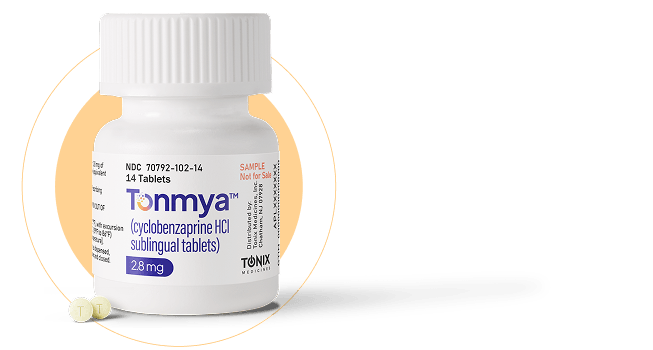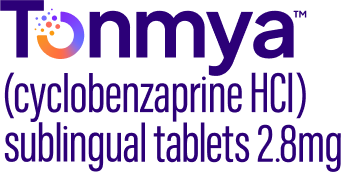For your adult patients
with fibromyalgia,Turn fibromyalgia's multiple symptom days into multiple moment days
Not an actual patient.
Tonmya™ is the first FDA‑approved therapy for the treatment of fibromyalgia in adults in over 15 years1-4
- Evaluated across multiple symptoms of fibromyalgia, including pain, sleep, and fatigue1,5*Explore Efficacy
- Demonstrated safety profile in over 1400 patients1See Safety Profile
- Unique sublingual formulation designed for rapid absorption with bedtime dosing1,5,6View Dosing
Consider TONMYA as part of a multimodal treatment approach,
alongside nonpharmacologic therapy, for your adult patients with fibromyalgia
*TONMYA was evaluated in 3 clinical trials: RELIEF, RALLY, and RESILIENT. Change from baseline at Week 14 in weekly average of daily diary pain intensity scores was evaluated as the primary endpoint. In RALLY, there was no statistically significant treatment group difference between TONMYA and placebo. Results of this trial may not have been generalizable due to the presence of factors outside the conduct of the study.1
Eligible, commercially insured patients can pay as little as $0 through the TONMYA Savings Program.
Restrictions apply. Subject to change.
See full Terms and Conditions.†
†Valid only for those patients with commercial prescription insurance coverage who meet eligibility criteria. Offer not valid for (i) prescriptions paid, in whole or in part, by any federal, state, or government‑funded insurance programs (for example, Medicare, Medicare Advantage, Medigap, Medicaid, Veterans Affairs (VA), Department of Defense (DoD), or TRICARE), (ii) for cash‑paying patients, (iii) where product is not covered by patient’s commercial insurance, (iv) where patient’s commercial insurance plan reimburses them for the entire cost of their prescription drug, or (v) where prohibited by law or by the patient’s health insurance provider. If at any time a patient begins receiving prescription drug coverage under any federal, state, or government‑funded healthcare program, patient will no longer be able to use the Tonmya Together™ Savings Program and patient must notify Tonix Medicines at 1‑844‑851‑3390 to stop participation. Patients may not seek reimbursement for the value of the out‑of‑pocket expense covered by the Program from any third‑party payer, whether public or private. The Program is valid ONLY for qualifying patients residing in the 50 U.S. states or Puerto Rico with commercial insurance who have a valid prescription for an FDA‑approved indication for the qualifying Tonix Medicines therapy. The Program is not health insurance. This offer may not be combined with any other rebate, coupon or offer. Out‑of‑pocket assistance under the Program is not transferable. Tonix Medicines reserves the right to rescind, revoke, or amend the Program without notice. The patient/caregiver must certify their responsibility for complying with applicable limitations, if any, of any commercial insurance and reporting requirements regarding receipt of Program benefits, if necessary, to any commercial insurer. The Program is subject to termination or modification at any time. Some restrictions apply.

Not actual size.
Have questions about TONMYA?
For fibromyalgia tomorrow, TONMYA tonight
TONMYA was FDA-approved based on two clinical trials that evaluated adults with fibromyalgia taking TONMYA once daily at bedtime at 14 weeks
TONMYA was FDA-approved based on two clinical trials that evaluated adults with fibromyalgia taking TONMYA once daily at bedtime at 14 weeks
INDICATION
TONMYA is indicated for the treatment of fibromyalgia in adults.
IMPORTANT SAFETY INFORMATION
CONTRAINDICATIONS
TONMYA is contraindicated:
- In patients with hypersensitivity to cyclobenzaprine or any inactive ingredient in TONMYA. Hypersensitivity reactions may manifest as an anaphylactic reaction, urticaria, facial and/or tongue swelling, or pruritus. Discontinue TONMYA if a hypersensitivity reaction is suspected.
- With concomitant use of monoamine oxidase (MAO) inhibitors or within 14 days after discontinuation of an MAO inhibitor. Hyperpyretic crisis seizures and deaths have occurred in patients who received cyclobenzaprine (or structurally similar tricyclic antidepressants) concomitantly with MAO inhibitors drugs.
- During the acute recovery phase of myocardial infarction, and in patients with arrhythmias, heart block or conduction disturbances, or congestive heart failure.
- In patients with hyperthyroidism.
WARNINGS AND PRECAUTIONS
- Embryofetal toxicity: Based on animal data, TONMYA may cause neural tube defects when used two weeks prior to conception and during the first trimester of pregnancy. Advise females of reproductive potential of the potential risk and to use effective contraception during treatment and for two weeks after the final dose. Perform a pregnancy test prior to initiation of treatment with TONMYA to exclude use of TONMYA during the first trimester of pregnancy.
- Serotonin syndrome: Concomitant use of TONMYA with selective serotonin reuptake inhibitors (SSRIs), serotonin norepinephrine reuptake inhibitors (SNRIs), tricyclic antidepressants, tramadol, bupropion, meperidine, verapamil, or MAO inhibitors increases the risk of serotonin syndrome, a potentially life‑threatening condition. Serotonin syndrome symptoms may include mental status changes, autonomic instability, neuromuscular abnormalities, and/or gastrointestinal symptoms. Treatment with TONMYA and any concomitant serotonergic agent should be discontinued immediately if serotonin syndrome symptoms occur and supportive symptomatic treatment should be initiated. If concomitant treatment with TONMYA and other serotonergic drugs is clinically warranted, careful observation is advised, particularly during treatment initiation or dosage increases.
- Tricyclic antidepressant‑like adverse reactions: Cyclobenzaprine is structurally related to TCAs. TCAs have been reported to produce arrhythmias, sinus tachycardia, prolongation of the conduction time leading to myocardial infarction and stroke. If clinically significant central nervous system (CNS) symptoms develop, consider discontinuation of TONMYA. Caution should be used when TCAs are given to patients with a history of seizure disorder, because TCAs may lower the seizure threshold. Patients with a history of seizures should be monitored during TCA use to identify recurrence of seizures or an increase in the frequency of seizures.
- Atropine‑like effects: Use with caution in patients with a history of urinary retention, angle‑closure glaucoma, increased intraocular pressure, and in patients taking anticholinergic drugs.
- CNS depression and risk of operating a motor vehicle or hazardous machinery: TONMYA monotherapy may cause CNS depression. Concomitant use of TONMYA with alcohol, barbiturates, or other CNS depressants may increase the risk of CNS depression. Advise patients not to operate a motor vehicle or dangerous machinery until they are reasonably certain that TONMYA therapy will not adversely affect their ability to engage in such activities.
- Oral mucosal adverse reactions: In clinical studies with TONMYA, oral mucosal adverse reactions occurred more frequently in patients treated with TONMYA compared to placebo. Advise patients to moisten the mouth with sips of water before administration of TONMYA to reduce the risk of oral sensory changes (hypoesthesia). Consider discontinuation of TONMYA if severe reactions occur.
ADVERSE REACTIONS
The most common adverse reactions (incidence ≥2% and at a higher incidence in TONMYA‑treated patients compared to placebo‑treated patients) were oral hypoesthesia, oral discomfort, abnormal product taste, somnolence, oral paresthesia, oral pain, fatigue, dry mouth, and aphthous ulcer.
DRUG INTERACTIONS
- MAO inhibitors: Life‑threatening interactions may occur.
- Other serotonergic drugs: Serotonin syndrome has been reported.
- CNS depressants: CNS depressant effects of alcohol, barbiturates, and other CNS depressants may be enhanced.
- Tramadol: Seizure risk may be enhanced.
- Guanethidine or other similar acting drugs: The antihypertensive action of these drugs may be blocked.
USE IN SPECIFIC POPULATIONS
- Pregnancy: Based on animal data, TONMYA may cause fetal harm when administered to a pregnant woman. The limited amount of available observational data on oral cyclobenzaprine use in pregnancy is of insufficient quality to inform a TONMYA‑associated risk of major birth defects, miscarriage, or adverse maternal or fetal outcomes. Advise pregnant women about the potential risk to the fetus with maternal exposure to TONMYA and to avoid use of TONMYA two weeks prior to conception and through the first trimester of pregnancy. Report pregnancies to the Tonix Medicines, Inc., adverse‑event reporting line at 1‑888‑869‑7633 (1‑888‑TNXPMED).
- Lactation: A small number of published cases report the transfer of cyclobenzaprine into human milk in low amounts, but these data cannot be confirmed. There are no data on the effects of cyclobenzaprine on a breastfed infant, or the effects on milk production. The developmental and health benefits of breastfeeding should be considered along with the mother's clinical need for TONMYA and any potential adverse effects on the breastfed child from TONMYA or from the underlying maternal condition.
- Pediatric use: The safety and effectiveness of TONMYA have not been established.
- Geriatric patients: Of the total number of TONMYA‑treated patients in the clinical trials in adult patients with fibromyalgia, none were 65 years of age and older. Clinical trials of TONMYA did not include sufficient numbers of patients 65 years of age and older to determine whether they respond differently from younger adult patients.
- Hepatic impairment: The recommended dosage of TONMYA in patients with mild hepatic impairment (HI) (Child Pugh A) is 2.8 mg once daily at bedtime, lower than the recommended dosage in patients with normal hepatic function. The use of TONMYA is not recommended in patients with moderate HI (Child Pugh B) or severe HI (Child Pugh C). Cyclobenzaprine exposure (AUC) was increased in patients with mild HI and moderate HI compared to subjects with normal hepatic function, which may increase the risk of TONMYA‑associated adverse reactions.
Please see additional safety information in the full Prescribing Information.
To report suspected adverse reactions, contact Tonix Medicines, Inc. at 1‑888‑869‑7633, or the FDA at 1‑800‑FDA‑1088 or www.fda.gov/medwatch.
TMY‑HCP‑250124 12/25
References: 1. TONMYA™ (cyclobenzaprine HCI) [prescribing information]. Chatham, NJ: Tonix Medicines, Inc.; 2025. 2. LYRICA® (pregabalin) [prescribing information]. Morgantown, WV: Viatris Specialty, LLC, a Viatris Company; 2025. 3. CYMBALTA® (duloxetine delayed-release capsules) [prescribing information]. Indianapolis, IN: Eli Lilly and Company; 2023. 4. SAVELLA® (milnacipran HCI) [prescribing information]. Chicago, IL: Allergan Sales, LLC, an AbbVie Company; 2023. 5. Lederman S, Arnold LM, Vaughn B, Engels JM, Kelley M, Sullivan GM. Pain relief by targeting nonrestorative sleep in fibromyalgia: a phase 3 randomized trial of bedtime sublingual cyclobenzaprine. Pain Medicine, 2025: pnaf089, doi:10.1093/pm/pnaf089 6. Data on File, Tonix Medicines, Inc.
TMY‑HCP‑250112 12/25
